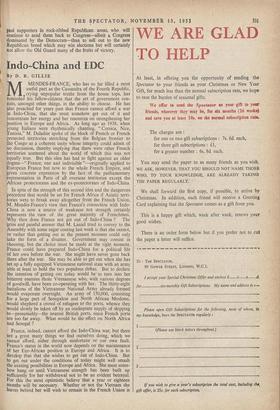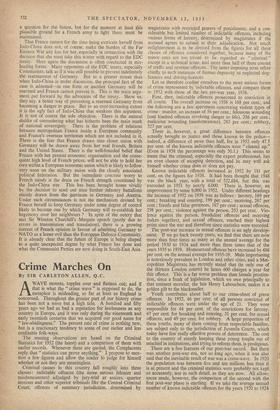Indo-China and EDC
By D. R. GILLIE MMENDES-FRANCE, who has so far filled a most useful part as the Cassandra of the Fourth Republic, ,crying unpopular truths from the house tops, has reminded his fellow-citizens that the art of government con- sists, amongst other things, in the ability to choose. He has also preached for years past that France cannot afford a war in Indo-China, that she must somehow get out of it and concentrate her energy and her resources on strengthening her position in Europe and Africa. As long ago as 1938, when young Italians were rhythmically chanting, "Corsica, Nice, Tunisia," M. Daladier spoke of the block of French or French protected territories stretching from the Belgian frontier to the Congo as a coherent unity whose integrity could admit of no discussion, thereby implying that there were other French territories scattered about the World of which this was not equally true. But this idea has had to fight against an older dogma—" France, one and indivisible "—originally applied to European France but now, to the whole French Empire, and given concrete expression by the fact of the parliamentary representation in Paris of all overseas territories except the African protectorates and the ex-protectorates of Indo-China.
In spite of the strength of this second idea and the dangerous precedent that would be set for French Africa if Asiatic terri- tories were to break away altogether from the French Union, M. Mendes-France's view that France's connection with Indo- China is now a source of weakness not strength certainly represents the view of the great majority of Frenchmen. Why then does France not get out of Indo-China ? The grim and painful answer that M. Laniel tried to convey to the Assembly with some sugar coating last week is that she cannot, or rather that getting out at the present moment could only take the form of a disaster. Government may consist in choosing, but the choice must be made at the right moment. France could have prepared Indo-China for a political life of her own before the war. She might have never gone back there after the war. She may be able to get out when she has set up a fully equipped Vietnamese national state with an army able at least to hold the two populous deltas. But to declare the intention of' getting out today would be to turn into her bitterest enemies thoAe Vietnamese who, with various degrees of goodwill, have been co-operating with her. The thirty-eight battalions of the Vietnamese National Army already formed Would evaporate overnight. An army of 156,000, consisting for a large part of Senegalese and North African Moslems, Would shepherd a crowd of refugees to the ports, whence they Would slowly be taken off by an inadequate supply of shipping to—presumably—the nearest British ports, since French ports are too far away. What would be the effect on North Africa and Senegal ?
France, indeed, cannot afford the Indo-China war, but there are a great many things we find ourselves doing, which we cannot afford, either through misfortune or our own fault. France's status in the, world now depends on the maintenance of her Eur-African position in Europe and Africa. It is to develop that that she wishes to get out of Indo-China. But to get out under the conditions of today might well smash the existing possibilities in Europe and Africa. She must some- how hang on until Vietnamese strength has been built up sufficiently for her withdrawal not to be an evident betrayal. For this the most optimistic believe that a year or eighteen months will be necessary. Whether or not the Vietnam she leaves behind her will wish to remain in the French Union is a question for the future, but for the moment at least this plausible ground for a French army to fight 'there must be maintained.
That France cannot for the time being extricate herself from Judo-China does not,' of course, make the burden of the Far Eastern War any less for her, especially in connection with the decision that she must take this winter with regard to the EDC treaty. Here again the discussion is often conducted in mis- leading forms. Many opponents of the EDC treaty, especially Communists, talk as if it was still possible to prevent indefinitely the rearmament of Germany. But to a greater extent than when Indo-China is under discussion, the principal fact of the case is admitted—in one form or another Germany will be rearmed and France cannot prevent it. This is the main argu- ment put forward by the advocates of the treaty. Show us, they say, a better way of preventing a rearmed Germany from becoming a danger to peace. But to an ever-increasing extent it is the ugly fact of Indo-China that weakens this argument. It is not of course the sole objection. There is the natural dislike of surrendering what has hitherto been the main mark of national sovereignty. There is the problem of relations between metropolitan France inside a European community and France's overseas territories which are not included in it. There is the fear that France drawn into closer union with Germany will be drawn away from her real friends, Britain and the United States. There is the well-founded belief that France with her present economic organisation and the conse- quent high level of French prices, will not be able to hold her own within a European economic union which is likely to follow very soon on the military union with the closely associated political federation. But the immediate concrete worry to French minds is the drain on French strength constituted by the Indo-China war. This has been brought home vividly by the decision to send out nine further infantry battalions mainly drawn from the garrisons in Germany and Austria. Under such circumstances is not the mechanism devised by France, herself to keep Germany under some degree of control likely to become one by which Germany will re-establish her hegemony over her neighbours ? In spite of the outcry that met Sir Winston Churchill's Margate speech (partly due to errors in transmission and translation), there is a growing current of French opinion in favour of admitting Germany to NATO as a lesser evil than the European Defence Community. It is already clear that the future of Europe is being shaped to a quite unexpected degree by what France has done ancL what the Communist Parties are now doing in South-East Asia.

































 Previous page
Previous page